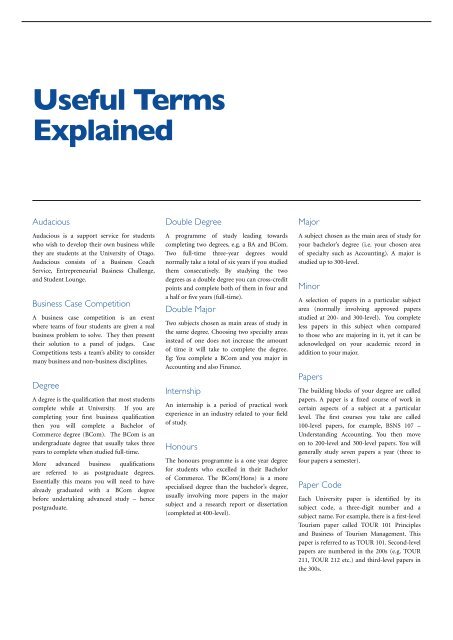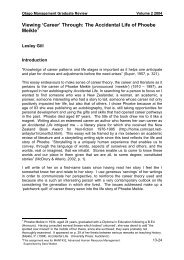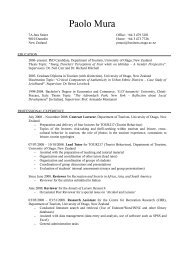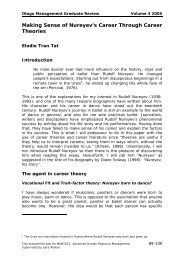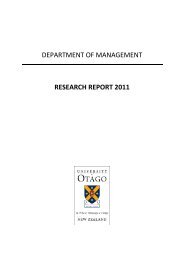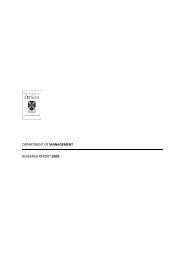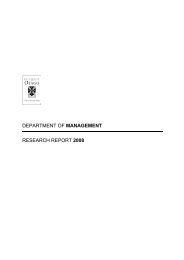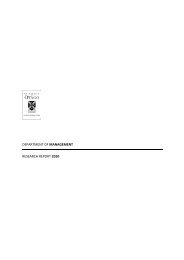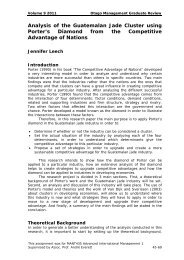at Otago - School of Business, University of Otago, New Zealand ...
at Otago - School of Business, University of Otago, New Zealand ...
at Otago - School of Business, University of Otago, New Zealand ...
You also want an ePaper? Increase the reach of your titles
YUMPU automatically turns print PDFs into web optimized ePapers that Google loves.
Useful Terms<br />
Explained<br />
Audacious<br />
Audacious is a support service for students<br />
who wish to develop their own business while<br />
they are students <strong>at</strong> the <strong>University</strong> <strong>of</strong> <strong>Otago</strong>.<br />
Audacious consists <strong>of</strong> a <strong>Business</strong> Coach<br />
Service, Entrepreneurial <strong>Business</strong> Challenge,<br />
and Student Lounge.<br />
<strong>Business</strong> Case Competition<br />
A business case competition is an event<br />
where teams <strong>of</strong> four students are given a real<br />
business problem to solve. They then present<br />
their solution to a panel <strong>of</strong> judges. Case<br />
Competitions tests a team’s ability to consider<br />
many business and non-business disciplines.<br />
Degree<br />
A degree is the qualific<strong>at</strong>ion th<strong>at</strong> most students<br />
complete while <strong>at</strong> <strong>University</strong>. If you are<br />
completing your first business qualific<strong>at</strong>ion<br />
then you will complete a Bachelor <strong>of</strong><br />
Commerce degree (BCom). The BCom is an<br />
undergradu<strong>at</strong>e degree th<strong>at</strong> usually takes three<br />
years to complete when studied full-time.<br />
More advanced business qualific<strong>at</strong>ions<br />
are referred to as postgradu<strong>at</strong>e degrees.<br />
Essentially this means you will need to have<br />
already gradu<strong>at</strong>ed with a BCom degree<br />
before undertaking advanced study – hence<br />
postgradu<strong>at</strong>e.<br />
Double Degree<br />
A programme <strong>of</strong> study leading towards<br />
completing two degrees, e.g. a BA and BCom.<br />
Two full-time three-year degrees would<br />
normally take a total <strong>of</strong> six years if you studied<br />
them consecutively. By studying the two<br />
degrees as a double degree you can cross-credit<br />
points and complete both <strong>of</strong> them in four and<br />
a half or five years (full-time).<br />
Double Major<br />
Two subjects chosen as main areas <strong>of</strong> study in<br />
the same degree. Choosing two specialty areas<br />
instead <strong>of</strong> one does not increase the amount<br />
<strong>of</strong> time it will take to complete the degree.<br />
Eg: You complete a BCom and you major in<br />
Accounting and also Finance.<br />
Internship<br />
An internship is a period <strong>of</strong> practical work<br />
experience in an industry rel<strong>at</strong>ed to your field<br />
<strong>of</strong> study.<br />
Honours<br />
The honours programme is a one year degree<br />
for students who excelled in their Bachelor<br />
<strong>of</strong> Commerce. The BCom(Hons) is a more<br />
specialised degree than the bachelor’s degree,<br />
usually involving more papers in the major<br />
subject and a research report or dissert<strong>at</strong>ion<br />
(completed <strong>at</strong> 400-level).<br />
Major<br />
A subject chosen as the main area <strong>of</strong> study for<br />
your bachelor’s degree (i.e. your chosen area<br />
<strong>of</strong> specialty such as Accounting). A major is<br />
studied up to 300-level.<br />
Minor<br />
A selection <strong>of</strong> papers in a particular subject<br />
area (normally involving approved papers<br />
studied <strong>at</strong> 200- and 300-level). You complete<br />
less papers in this subject when compared<br />
to those who are majoring in it, yet it can be<br />
acknowledged on your academic record in<br />
addition to your major.<br />
Papers<br />
The building blocks <strong>of</strong> your degree are called<br />
papers. A paper is a fixed course <strong>of</strong> work in<br />
certain aspects <strong>of</strong> a subject <strong>at</strong> a particular<br />
level. The first courses you take are called<br />
100-level papers, for example, BSNS 107 –<br />
Understanding Accounting. You then move<br />
on to 200-level and 300-level papers. You will<br />
generally study seven papers a year (three to<br />
four papers a semester).<br />
Paper Code<br />
Each <strong>University</strong> paper is identified by its<br />
subject code, a three-digit number and a<br />
subject name. For example, there is a first-level<br />
Tourism paper called TOUR 101 Principles<br />
and <strong>Business</strong> <strong>of</strong> Tourism Management. This<br />
paper is referred to as TOUR 101. Second-level<br />
papers are numbered in the 200s (e.g. TOUR<br />
211, TOUR 212 etc.) and third-level papers in<br />
the 300s.


